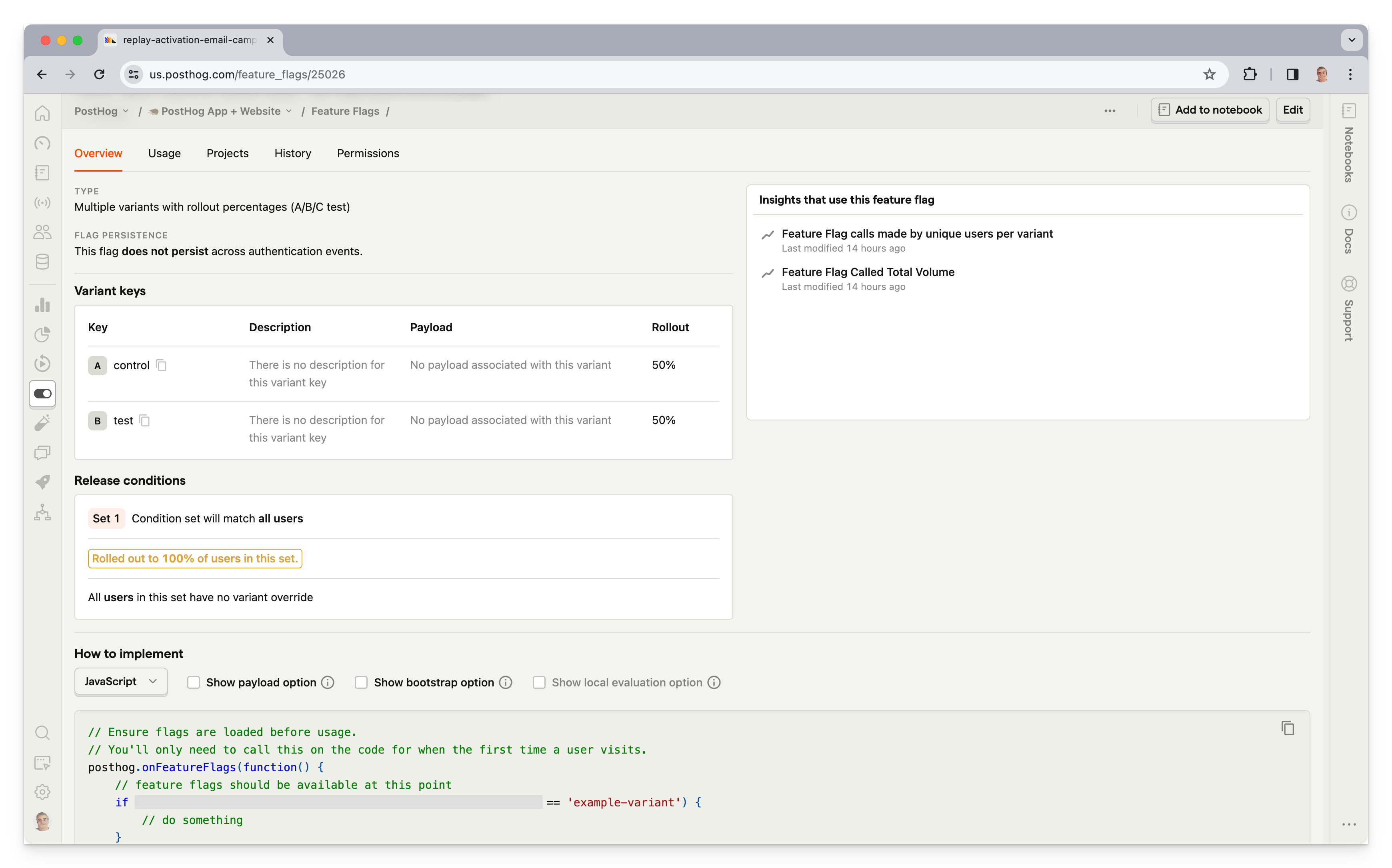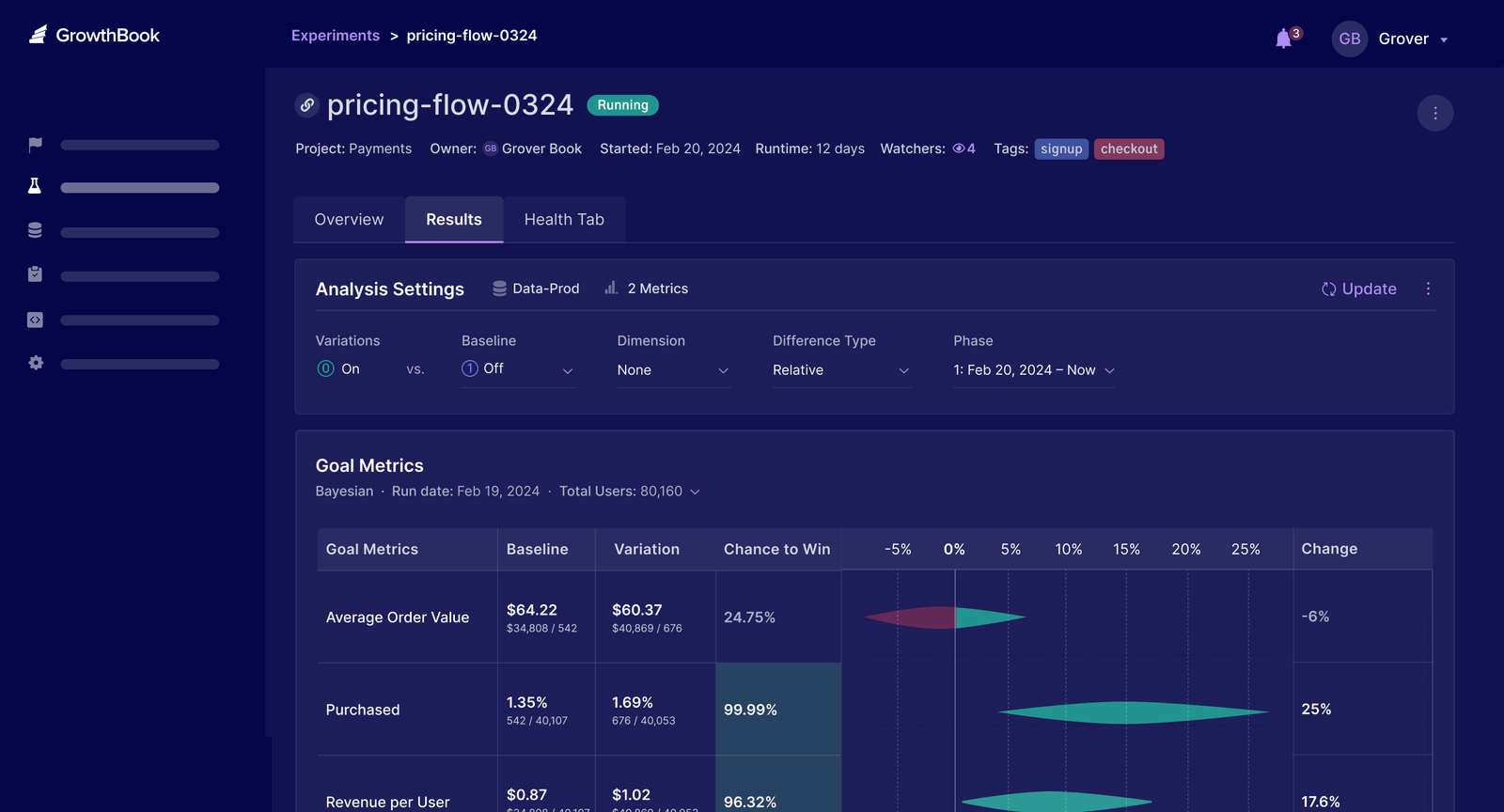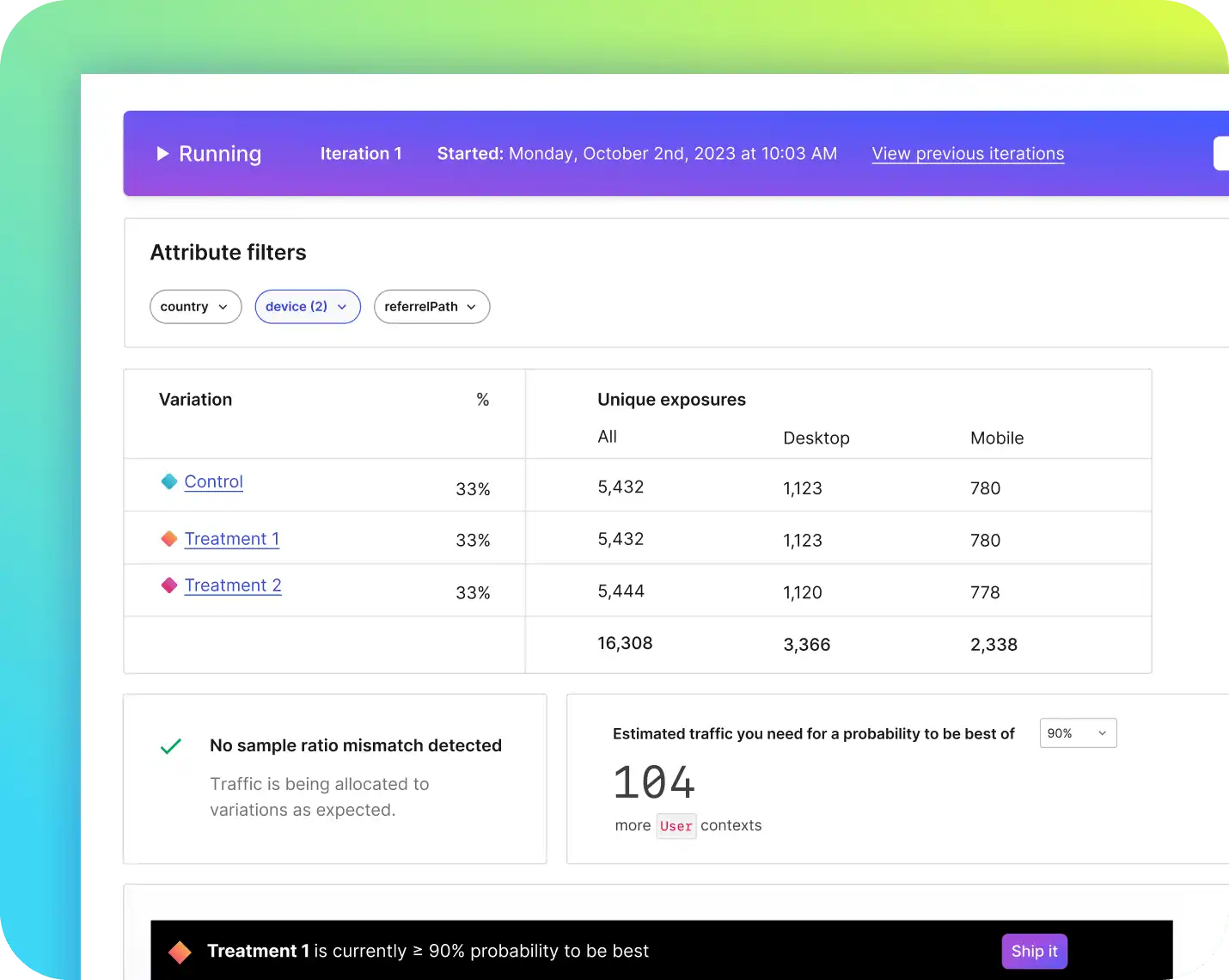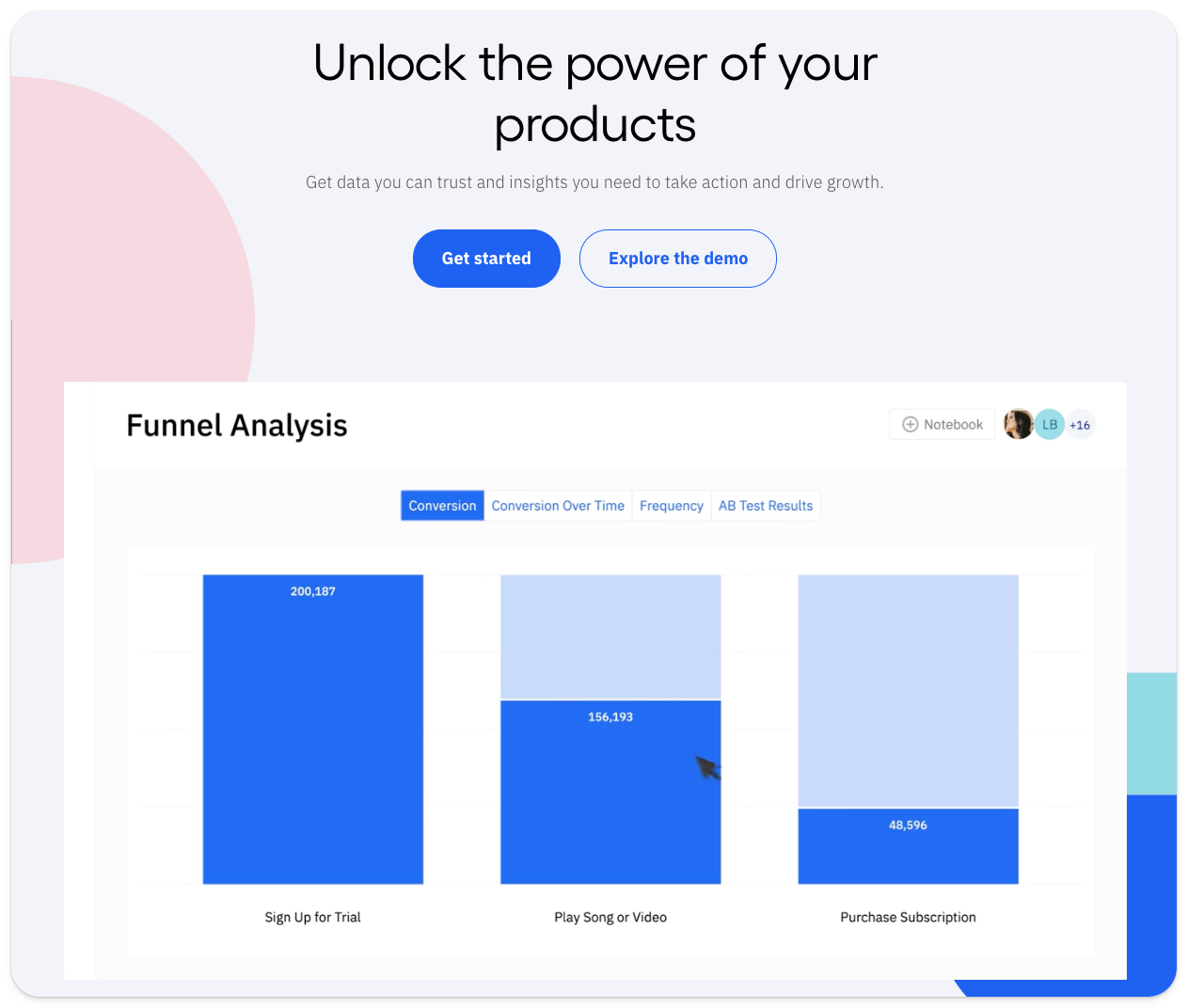The best Eppo alternatives & competitors, compared
Contents
1. PostHog
- Founded: 2020
- Similar to: Statsig, Amplitude
- Typical users: Engineers and product teams

What is PostHog?
PostHog (that's us 👋) is an open-source platform combining feature flags, A/B testing, product analytics, session replay, and surveys into one product. This means it's not only an alternative to Eppo, but also tools like Amplitude and Hotjar.
Typical PostHog users are engineers and product managers at startups and mid-size companies, particularly B2B companies. Customers include AssemblyAI, Hasura, Vendasta, and Airbus.
Key features
🚩 Feature flags: Rollout features safely with local evaluation (for faster performance), JSON payloads, and instant rollbacks.
🧪 A/B tests: Experiment in your app with up to nine test variations and track impact on primary and secondary metrics. Auto-calculate test duration, sample size, and statistical significance.
📈 Product analytics: Custom trends, funnels, user paths, retention analysis, and segment user cohorts. Also, direct SQL querying for power users.
📺 Session replays: View exactly how users are using your site. Includes event timelines, console logs, network activity, and 90-day data retention.
💬 Surveys: Target surveys by event or person properties. Templates for net promoter score (NPS), product-market fit (PMF) surveys, and more.
How does PostHog compare to Eppo?
Both Eppo and PostHog support core feature flag and A/B testing components. The biggest difference is their approach to data warehouses:
Eppo is warehouse-native, meaning that it integrates with your existing data tools like Snowflake or Postgres.
PostHog is not warehouse-native, but instead aims to replace your existing data stack by combining product analytics, pipelines, and warehousing into one platform. This eliminates the need for stitching together integrations between third-party tools, and makes it easier for engineers to work with data.
Besides this, PostHog offers product analytics, session replays, and surveys, whereas Eppo does not. On the other hand, Eppo offers multi-armed bandit testing (called "contextual bandits" in Eppo) and CUPED analysis, whereas PostHog does not.
Why do companies use PostHog?
According to G2 reviews, companies use PostHog because:
It's many tools in one: PostHog can replace Eppo (feature flags and A/B testing), Amplitude (analytics), and Hotjar (feedback and surveys). This simplifies workflows and ensures all product data is in one place.
They need a complete picture of users: PostHog includes every tool necessary to understand users and build better products. This means creating funnels to track conversion, watching replays to see where users get stuck, testing solutions with A/B tests, and gathering feedback with user surveys.
It's easy to get started: Many users love how PostHog's event autocapture means they can go from implementing its tracking code to ingesting events in just a few minutes. Enabling session replay is equally straightforward, so you can instantly start seeing how people are navigating your app or website.
Bottom line
PostHog is an ideal Eppo alternative if you're looking for a powerful all-in-one tool that can also serve your A/B testing and feature flag needs. It also offers a dedicated EU-hosted cloud at no extra cost.
2. GrowthBook
- Founded: 2020
- Similar to: LaunchDarkly, Statsig
- Typical users: Engineers and data scientists

What is GrowthBook?
GrowthBook is a warehouse-native feature flag and experimentation platform. Its biggest selling point is integrating with the product and data tools you already use.
It's a popular choice for companies in strict regulatory environments because it's self-hostable and warehouse-native, but you can also use its hosted cloud version.
Key features
🚩 Feature flags: Robust feature-flagging capabilities with custom targeting and scheduling.
🔧 Warehouse-native: Designed to integrate seamlessly with your existing data tools like Snowflake or Postgres.
🧪 A/B testing: Experimentation suite built on feature flags with a visual editor to optimize UI changes.
📊 Analysis: Use either Bayesian or Frequentist engines. Connect your existing data and do retroactive analysis.
🔌 Integrations: Connects with data warehouses and analytics tools, but has limited integrations beyond that.
How does GrowthBook compare to Eppo?
GrowthBook is the most similar alternative to Eppo on this list. It matches almost all of Eppo's features, plus has the added bonus of being self-serve with transparent pricing.
Why do companies use GrowthBook?
According to G2, reviewers choose GrowthBook for the following.
Warehouse-native: GrowthBook's integrations with the warehouses people are already using is a standout feature. It enables them to extract and make use of existing data.
Visual editor: The visual A/B test editor and experiment preview enable non-technical users to make full use of GrowthBook.
Self-hostable: Reviewers like that they have full control over GrowthBook by running it on their own infrastructure. This means no limits to data.
Bottom line
Being open source, free, and self-hostable, GrowthBook makes for a good alternative to Eppo, especially for companies in tricky regulatory situations.
3. Statsig
- Founded: 2021
- Similar to: LaunchDarkly, PostHog
- Typical users: Engineering and DevOps teams

What is Statsig?
Statsig provides tools like feature flags, experimentation, and analytics to help companies build better products. Teams use Statsig to take the risk out of releases, experiment with new features, and monitor changes. It also includes a warehouse-native mode to connect directly and utilize your data warehouse.
Key features
🚩 Feature flags: Take the risk out of releases with targeted feature flag rollouts.
🧪 Experimentation: Measure the impact of new changes with frequentist and Bayesian analysis engines.
🔧 Warehouse-native: Designed to integrate seamlessly with your existing data tools like Snowflake or Postgres.
📊 Analytics: Provides a single location for your metrics. Enables users to dive deeper into them with trends, bar charts, and retention analysis.
How does Statsig compare to Eppo?
Statsig is another similar alternative to Eppo. It includes feature flags, warehouse-native mode, and advanced A/B testing techniques such as multi-armed bandit testing. However, its feature flags are limited to booleans only and don't support string, number, or JSON values.
Why do companies use Statsig?
According to G2, users are big fans of Statsig because:
Experiments-focused: Statsig provides all the tools to run successful experiments. Reviewers write this enables them to ship faster and create an experimentation mindset.
Responsiveness: The Statsig team is responsive to user issues and concerns. Reviewers appreciate how helpful support is.
Documentation: Thanks to the solid documentation of SDKs and features, in combination with a simple UX, reviewers find Statsig easy to set up and use.
Bottom line
Statsig's feature parity with Eppo combined with transparent pricing and self-serve almost make it a no-brainer. However, developers will find their boolean-only feature flags restricting.
4. LaunchDarkly
- Founded: 2014
- Similar to: Statsig, Flagsmith
- Typical users: Enterprise engineering and DevOps teams

What is LaunchDarkly?
LaunchDarkly is an enterprise feature flag and A/B testing platform. It helps developers de-risk releases, target experiences, and optimize their products. It provides automation and governance features to ensure teams are following engineering best practices.
Key features
🚩 Feature flags: Control and target the release of features using multi-variate flags with real-time updates and local evaluation.
🧪 Experimentations: Run A/B/n tests against metric groups and segment. Easily roll out winning variants.
🤖 Automation: Advanced automations enable teams to not only schedule flag states, but do progressive rollouts and trigger workflows.
🔍 Governance: Audit flag changes. Get visibility into flag state across platforms. Use roles-based access controls to decide who can access and change flag states.
How does LaunchDarkly compare to Eppo?
LaunchDarkly and Eppo offer similar feature management and A/B testing features, though LaunchDarkly's lack of multi-armed bandit experiments may be a barrier for teams looking to automate conversion optimizations.
Why do companies use LaunchDarkly?
According to G2 reviews, users appreciate these aspects of LaunchDarkly:
SDKs: Reviewers appreciate how easy it is to integrate LaunchDarkly into their apps thanks to the range of SDKs they provide, like JavaScript, Python, Android, and iOS.
Automations: LaunchDarkly provides automations like scheduled rollouts, rollout templates, DevOps pipeline integrations, and stale flag cleanup.
Speed and availability: High uptime and speed are critical for developers. Reviewers highlight local caching and edge computing integrations as critical ways LaunchDarkly supports these.
Bottom line
LaunchDarkly is a good alternative if you need powerful feature management options and don't need to run experiments directly in your data warehouse. Although its A/B testing tools lack some of Eppo's advanced features, it should be sufficient for most teams.
5. Flagsmith
- Founded: 2018
- Similar to: LaunchDarkly, GrowthBook
- Typical users: Developers, Product Teams

What is Flagsmith?
Flagsmith is an open-source tool designed to help teams manage feature releases and configurations across web, mobile, and server-side apps. Flagsmith enables teams to ship new features safely and iterate on their products more effectively.
It offers lots of flexibility when it comes to hosting. You can choose from data centers around the world to host your data, or you can self-host.
Key features
🚩 Feature flags: Control and target the release of features using multi-variate flags with real-time updates and local evaluation.
🧪 Experimentations: Run A/B/n tests against metric groups and segment. Easily roll out winning variants.
💼 Deployment options: Available as a hosted cloud service, on-premise, or in a private cloud.
How does Flagsmith compare to Eppo?
Flagsmith offers comprehensive feature flag capabilities similar to Eppo. However, while Eppo is warehouse-native and integrates deeply with data tools, Flagsmith emphasizes its open-source nature and flexibility in deployment options.
Flagsmith also calls out "remote config" as a core feature, but behind the scenes these are really just feature flags with JSON payloads. Thus Eppo and any alternative that supports JSON payloads support this too.
Why do companies use Flagsmith?
According to G2 reviews, users appreciate these aspects of Flagsmith:
Flexibility in deployment: Flagsmith can be hosted in the cloud, on-premise, or in a private cloud, providing flexibility to meet different security and compliance needs.
Open source: Flagsmith's open-source nature allows for full transparency and community contributions.
Comprehensive feature management: Flagsmith offers a wide range range of features for managing feature releases and iterations.
Bottom line
Flagsmith is an excellent Eppo alternative if you are looking for an open-source solution with flexible deployment options and comprehensive feature management capabilities.
6. Optimizely
- Founded: 2010
- Similar to: VWO
- Typical users: Enterprise marketing, frontend teams

What is Optimizely?
Optimizely is an all-in-one set of tools for marketing and product teams. It offers a combination of content management, marketing, web and feature experiments, and ecommerce optimization tools, all geared toward optimizing web experiences.
Key features
🕸️ Web experimentation: Use Optimizely's visual editor and on-page previews to create frontend experiments quickly.
🧪 Feature experimentation: Run targeted experiments anywhere on your stack. View detailed reports on their impact.
🤹 Project management: Idea backlogs, workflows, and design tools to coordinate experiments and content.
📝 Content management system: Manage, deliver, and optimize your content in a centralized location.
💸 Ecommerce optimization: Customize checkout workflow along with CMS and experimentation to create the best possible commerce experience.
How does Optimizely compare to Eppo?
Why do companies use Optimizely?
According to G2 reviews, people are fans of Optimizely because:
It's easy to use for non-engineers: Optimizely makes it easy for anyone to run web experiments thanks to no code visual editor.
It integrates with their analytics platforms: Optimizely doesn't have built-in analytics, but reviewers appreciate its integrations with Google Analytics, Adobe Analytics, and others.
It's business-oriented: Optimizely focuses on optimizing business, marketing, and ecommerce use cases, and helps users improve the core business metrics they care about most.
Bottom line
Optimizely's no code experiments make it a good choice if you need a tool that's accessible for non-technical teams, such as marketing.
7. Amplitude
- Founded: 2012
- Most similar to: PostHog, Statsig
- Typical users: Product managers, data analysts, marketing teams

What is Amplitude?
Amplitude was one of the original product analytics tools. Many large enterprise customers, like Ford, NBCUniversal, and Walmart rely on it. In recent years, it’s also added A/B testing, feature flags, and a customer data platform, making it an obvious alternative to Eppo.
Key features
🧪 A/B testing: Test new features on specific targets and analyze with primary, secondary, and counter metrics.
🤖 AI insight builder: Generate insights based on natural language requests, like "What is my purchase conversion rate?"
📈 Product analytics: Funnel and retention analysis, user paths, behavioral cohorts, custom dashboards, and more.
👦 Customer data platform: Combine analytics data with third-party tools for data governance, identity resolution, and data federation.
How does Amplitude compare to Eppo?
Like a few alternatives on this list, Amplitude doesn't support multi-armed bandit experiments. It makes up for this with powerful built-in product analytics, though.
Why do companies use Amplitude?
According to G2 reviews, people like Amplitude because:
It's simple to use: Amplitude makes it easy for non-technical users to get insights about their product and make improvements. Amplitude is built for users like product managers and marketers, making it a popular choice for them.
It offers built-in A/B testing: Amplitude offers integrated experimentation features. This enables companies to run experiments on existing cohorts, and then analyze the data in a single place.
It helps them become data-driven: Amplitude users appreciate it helps them become data-driven. It becomes easy to add data, visualize it, and make decisions, and they can use it as a source of truth thanks to its built-in customer data platform.
Bottom line
Like PostHog, Amplitude is a good alternative if you value powerful analytics and experimentation in one, though it's less geared to engineers than Eppo or PostHog.
Is PostHog right for you?
Here's the (short) sales pitch.
We're biased, obviously, but we think PostHog is the perfect Eppo replacement if:
- You value transparency. We're open source and open core.
- You want more than just A/B testing and feature flags. We have a full suite of product analytics, session replays, and surveys.
- You want to try before you buy. We're self-serve with a generous free tier.
Check out our product pages and read our docs to learn more.
PostHog is an all-in-one developer platform for building successful products. We provide product analytics, web analytics, session replay, error tracking, feature flags, experiments, surveys, LLM analytics, data warehouse, CDP, and an AI product assistant to help debug your code, ship features faster, and keep all your usage and customer data in one stack.









